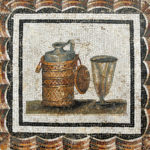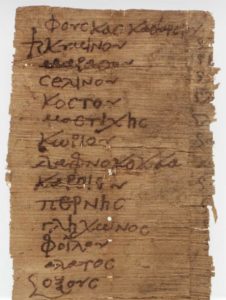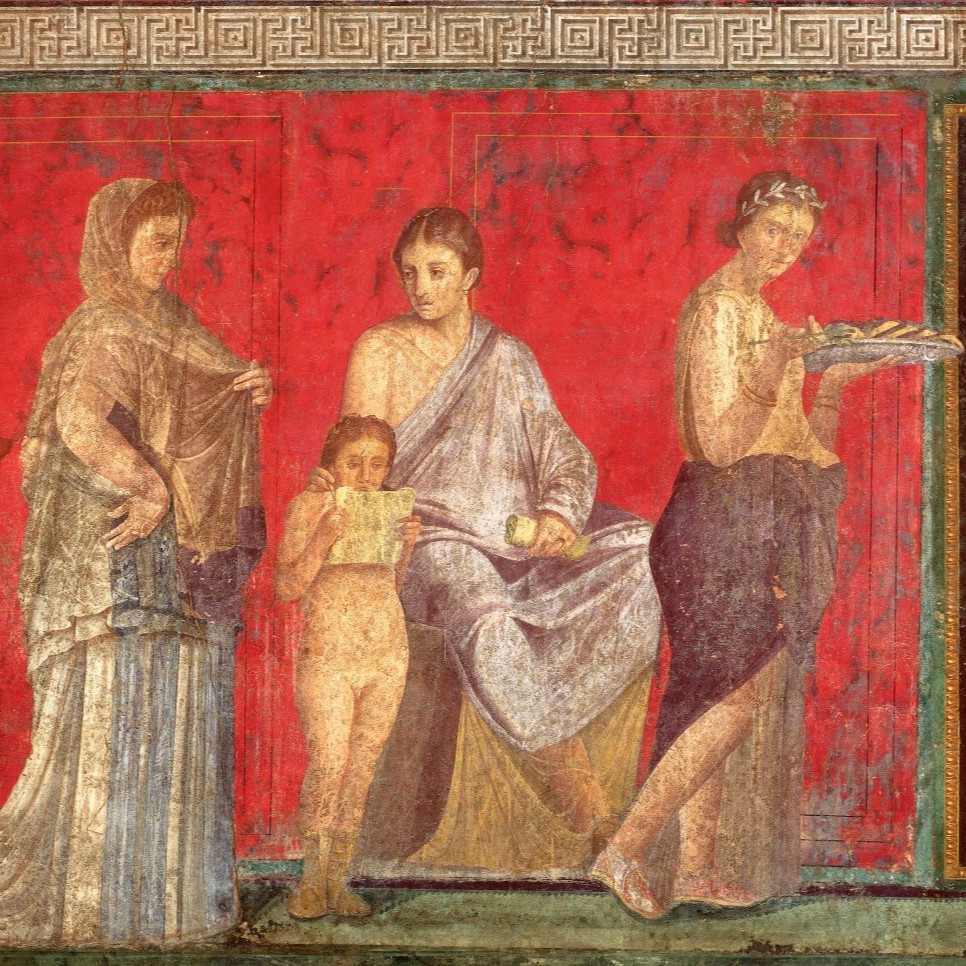Translated from French with Deepl (please notify us of errors)
 Thirsty? How about a little vinegar with water? Once you’ve got past the pungent smell and the sourness of the first sip, you might just enjoy this beverage that the Romans called “posca”. It was widely consumed, at least by those who could not quench their thirst with a large glass of Falerna: plebs, soldiers and slaves.
Thirsty? How about a little vinegar with water? Once you’ve got past the pungent smell and the sourness of the first sip, you might just enjoy this beverage that the Romans called “posca”. It was widely consumed, at least by those who could not quench their thirst with a large glass of Falerna: plebs, soldiers and slaves.
Vinegar certainly had the advantage of correcting the taste of poor quality water, which was rarely tasteless or odourless. But its acidity could also eliminate bacteria. The antiseptic virtues were not the only ones that the Ancients attributed to this altered wine.
Pliny the Elder made much of vinegar’s medicinal virtues. Not only does it “dispel disgust, it stops hiccups; when breathed in, it stops sneezing; when held in the mouth, it prevents people from being bothered by the heat of baths”, but – even better! – It is also a remedy for leprosy, furfuraceous eruptions, wet ulcers, dog bites, scorpion bites, scolopendra bites, shrew bites and the venomous and itching bites of all stinging animals”[1]. A thousand other virtues follow.

Vinegar water as a remedy was already used by ancient Greek doctors, who called it “oxycrat” (ὀξύκρατον), literally: the power of sour. All of the six recipes for posca that have come down to us come from medical texts written between the 2nd century BC and the 6th century[2]. In this therapeutic variant, in addition to vinegar and water, the drink almost always contains salt and spearmint. Plus various other ingredients depending on the ailment being treated.
The drink of the people and the army
The non-medical variant of posca, the drink of the people and the army, was certainly simpler. Perhaps a little honey to sweeten the drink, and a few spices to flavour it. But even without any other tricks, vinegar water has a surprising thirst-quenching power. For the soldier who received his portion of vinegar, the posca must have been a real blessing after a tiring march[3]. Some generals and emperors also liked to drink posca, out of austerity… or demagoguery. Plutarch tells us that Cato the Elder drank only water in the army, except when he was really thirsty and allowed himself a good posca… But if he felt his strength failing him, he agreed to drink a little piquette[4]. In the History Augustus, a text dating from the end of the 4th century, the author recounts that Hadrian (emperor from 117 to 138) liked to live with his soldiers and eat bacon, cheese and posca like them[5]. For the army, vinegar water also had another virtue, namely that it was not alcoholic: drunken armies rarely excelled on the battlefield…
Cheap, antiseptic and thirst-quenching, posca even made its way into gastronomy. Apicius gives two recipes for sala cattabia, a fresh dish made from breadcrumbs soaked in posca[6].
The recipe: try it and enjoy!
So much for the theory. Now all you have to do is taste it: dilute about a measure of good wine vinegar in a dozen measures of water, add a little honey and any spices you like (pepper, coriander seed, ginger, etc.), leave to stand, cool or add ice cubes, strain and enjoy.
May the force of sour be with you!
[1] Pliny the Elder, Natural History, Book 23, XXVIII, 1-2 : (…) per se haustum fastidia discutit, singultus cohibet, sternumenta olfactatum, in balineis aestus arcet, si contineatur ore (…) medetur pota hirudine, item lepris, furfuribus, ulceribus manantibus, canis morsibus, scorpionum ictibus, scolopendrarum, muris aranei contraque omnium aculeatorum venena et pruritus.
[2] Nicander of Colophon, Aëtius Iatrica 3.81-82 (2nd c. BC, two recipes); Papyrus of Oxyrhynchus 1384 (5th or 6th c.); Anthimus, De Obsevatione Ciborum, 58 (6th c.); Paul of Aegina, Epitomæ Medicæ 7.5.10 (7th c., two recipes).
[3] According to the Gospels (Matthew 27:48, Mark 15:36, Luke 23:36 and John 18:29), a Roman soldier hands Jesus on the cross a sponge soaked in vinegar. This has often been interpreted as additional cruelty. But if it is posca, it could be a gesture of compassion. However, this positive interpretation is counterbalanced by the negative symbolism associated with vinegar in the Bible, as in Psalm 68: “When I was thirsty, they gave me vinegar”. On this question, see the detailed article Aurait-on pu donner autre chose à boire que du vinaigre au Christ en croix ?
[4] Plutarch, Cato the Elder, 1.10: δωρ δ´ ἔπινεν ἐπὶ στρατείας, πλὴν εἴποτε διψήσας περιφλεγῶς ὄξος αἰτήσειεν ἢ τῆς ἰσχύος ἐνδιδούσης ἐπιλάβοι μικρὸν οἰνάριον.
[5] History of Augustus, Life of Adrien, IV.
[6] Apicius, De Re Coquinaria, Book IV, I. Sala cattabia (125-127).
December 2023. Reproduction prohibited
Other articles in English from the Nunc est bibendum blog








